Mesoponera caffraria (F. Smith)
  Type location South
Africa (Ponera Caffraria, F. Smith, 1858b: 91, queen; Forel,
1913a: 108, worker; Arnold, 1915: 65, worker & male; in Euponera (Mesoponera) Emery, 1901a:
46; in Pachycondyla
Bolton, 1995: 303; new placement by Schmidt & Shattuck, 2014: 110) Type location South
Africa (Ponera Caffraria, F. Smith, 1858b: 91, queen; Forel,
1913a: 108, worker; Arnold, 1915: 65, worker & male; in Euponera (Mesoponera) Emery, 1901a:
46; in Pachycondyla
Bolton, 1995: 303; new placement by Schmidt & Shattuck, 2014: 110)
subspecies
affinis
(Euponera (Mesoponera) caffraria
Sm.
var. affinis nov., Santschi,
1935b: 258, worker) from Congo, Brazzaville, A Weiss - see http://www.antweb.org/specimenImages.do?code=casent0915252
caffra (Euponera
caffra, Santschi, 1914d: 315 - name only; Euponera (Mesoponera) caffraria Sm.
var. caffra Santschi,
Santschi,
1935b: 259,
worker, noted as "non caffraria
Sm.") from Guinea, Kakoulima, collector F. Silvestri - see http://www.antweb.org/specimenImages.do?code=casent0915253
junior
synonym
guineensis (Ponera
guineensis nov. sp., André, 1890: 318, worker; synonymy of
worker with the queen of caffraria
by Mayr,
1895: 125, Emery, 1911d: 81; Euponera
(Mesoponera) caffraria Sm. v. guineensis
André, in Santschi, 1935b: 259) from Sierra
Leone, collector Mocquerys - see below.
all forms known (see Bolton, 1995)  . .
|
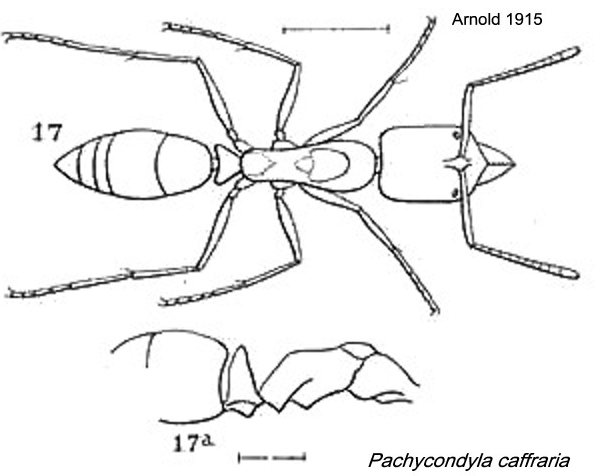 F
Smith's (1858b) description is at F
Smith's (1858b) description is at  . André's (1890) description of guineensis
is at . André's (1890) description of guineensis
is at  . Arnold's (1915: 65)
illustrated translation and description of the Euponera (Mesoponera) caffraria
worker is at . Arnold's (1915: 65)
illustrated translation and description of the Euponera (Mesoponera) caffraria
worker is at  and the male is at and the male is at  . Santschi's (1935b) description of affinis
and other notes is at . Santschi's (1935b) description of affinis
and other notes is at  . .
The size and features of P. caffraria worker according to
Arnold are TL 9 mm, black and dull, queen TL 10.5 mm, pubescence
greyish -yellow; worker scape barely reaching the occiput; anterior
third of the clypeus obliquely truncate (Santcshi, 1935b).
In contrast the West African-Congo Basin forms consistently have TL ca
7.0-7.5 mm and very dark brown, matt but somewhat shiny, with distinct
yellowish pubescence; worker scape clearly attaining and even
surpassing the occiput; anterior border f clyepus truncate and feebly
bordered (sillonée).
|
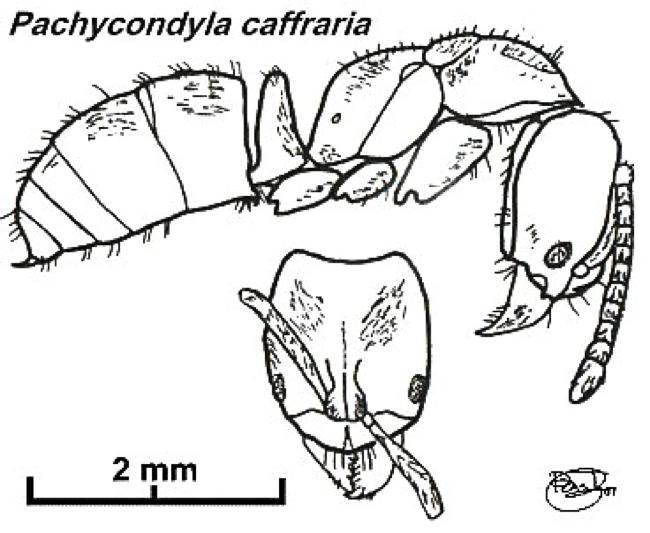 Nigeria
specimens (as Mesoponera species
T¹, Taylor, 1976: 25). WORKER. TL 7.6 mm, HL 1.93, HW 1.74, SL 1.40, PW
1.18 Nigeria
specimens (as Mesoponera species
T¹, Taylor, 1976: 25). WORKER. TL 7.6 mm, HL 1.93, HW 1.74, SL 1.40, PW
1.18
Dense pilosity but less on head. Mandibles large triangular, with more
than eight teeth. Clypeus longitudinally carinate. Metanotal groove
present and impressed. A distinct groove on the lateral mesonotum.
Propodeum compressed above, considerably narrower in dorsal view than
the pronotum, posterior face concave. Petiole a thick scale,
subpetiolar process with a blunt apical tooth at the anterior corner.
Colour nearly black, lighter on extremities.
I collected the specimens from a nest found in a rotting log on the
ground. This appears to be a close match for the description given for guineensis
by André (1890, see card).
Wheeler (1922) listed it also from Cameroun (at
?, H. Brauns) and widely across sub-Saharan Africa.
From Guinea, Bernard (1952) reported it as
having small, epigeal colonies. Findings, all savanna, were - typical
form - Kéoulenta D, 500 m, 9 workers, 1 queen; Ziéla (site B A3), 7
workers, ( site F) 1 worker. Variety guineensis (smaller, with
larger head, and black) Kéoulenta, 2 workers; Sérengbara, 1 worker;
site Fp, 4 workers. He noted that one of the Kéoulenta workers was
abnormally large (with TL 7.6, HW 1.7) but that such types were not
rare in Ponerines being fecund individuals, possibly replacements for
the true queens.
Other sizes TL 8.5-9.5 mm, Ivory Coast specimens
(Agbogba, 1984).
In Ghana, a single worker was collected (as Mesoponera
caffraria) from the ground at CRIG by Bigger (1981a) and it was
described as widespread in the semi-deciduous forest zone, from leaf
litter sampling, 86 workers from 8 sites, by Belshaw & Bolton
(1994b).
Agbogba, who made laboratory studies of foraging with
ants originally from Ivory Coast (supplied by T. Diomande and
M. Lepage), found that the foragers recruit and then run in tandem. He
summarised it as a soil species, foraging in and on the soil savannah,
but always in well-shaded areas, and never venturing onto vegetation
(Agbogba, 1984). Lévieux & Diomande (1978) in their description of
the activity of Pachycondyla sennaarensis, mention this species
as found at Ferkéssédougou.
|
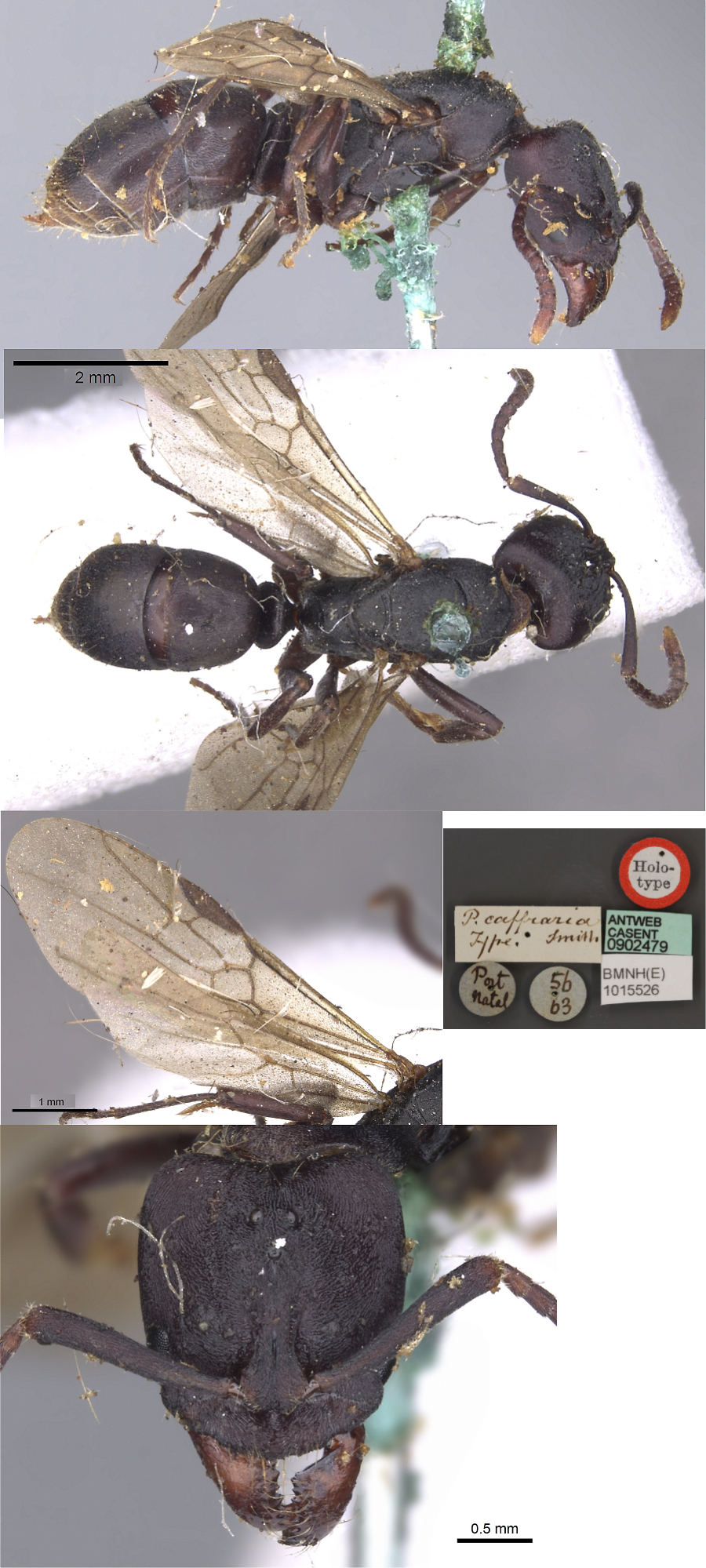 The
photomontage is of the holotype queen collated
from http://www.antweb.org/specimen.do?name=casent0902479 The
photomontage is of the holotype queen collated
from http://www.antweb.org/specimen.do?name=casent0902479
|
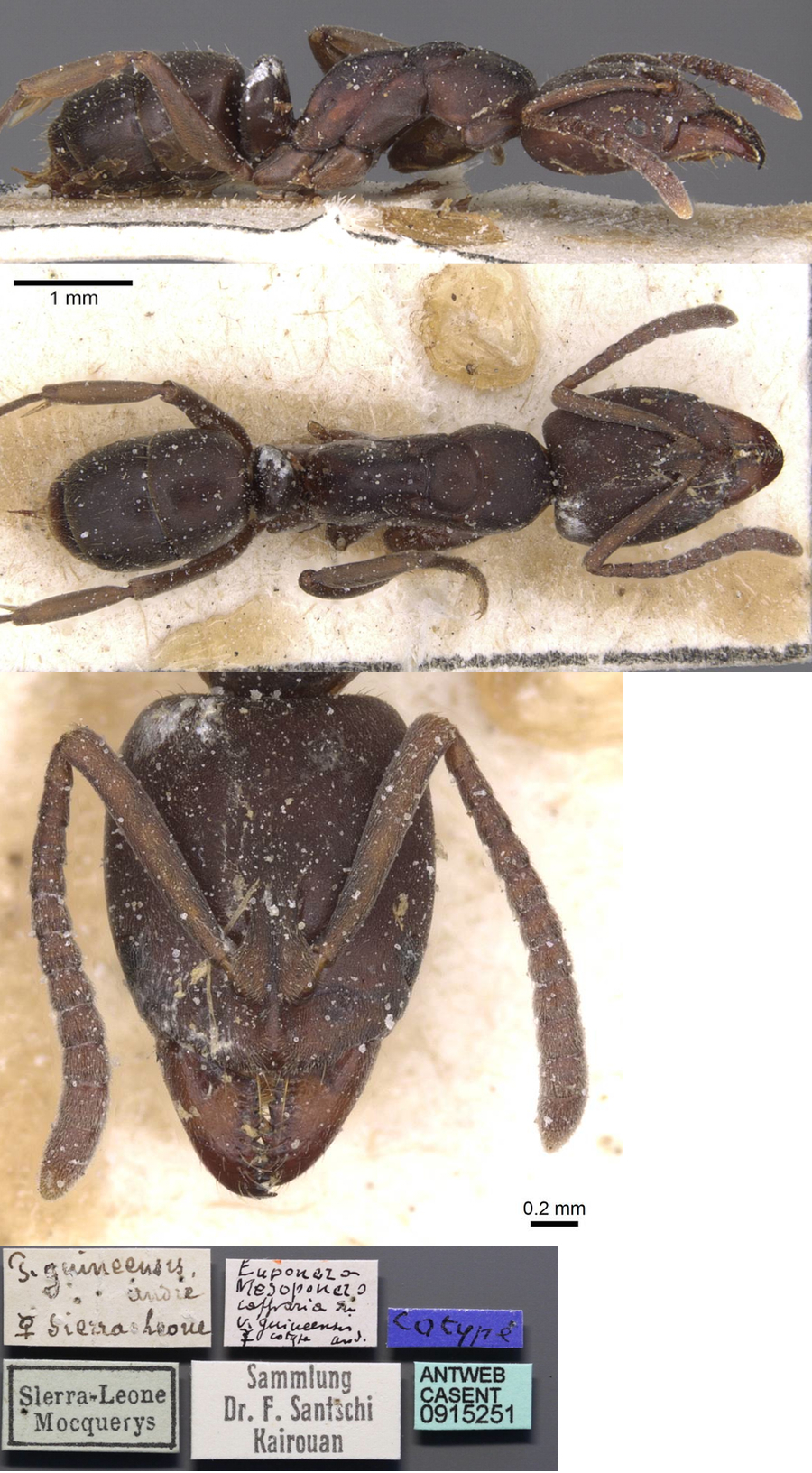 The
photomontage is of a cotype worker of guineensis collated
from http://www.antweb.org/specimen.do?name=casent0915251 The
photomontage is of a cotype worker of guineensis collated
from http://www.antweb.org/specimen.do?name=casent0915251
|
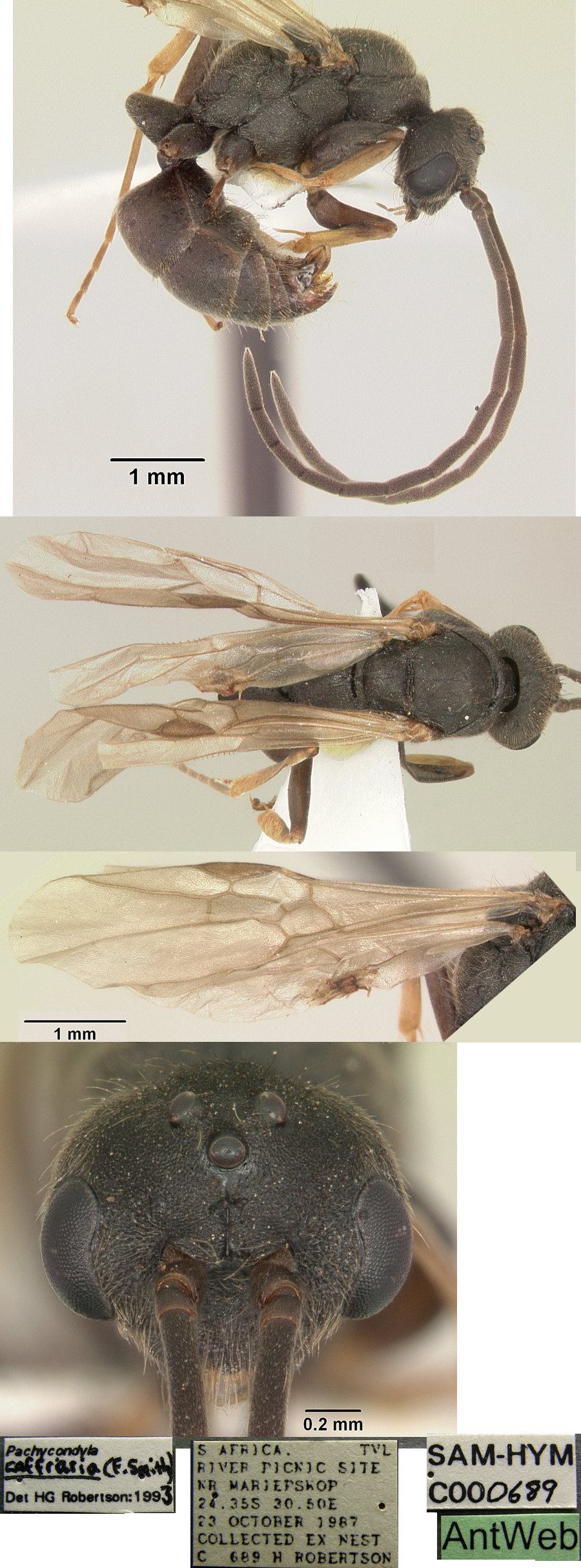 The
photomontage is of a male collated
from http://www.antweb.org/specimen.do?name=sam-hym-c000689a The
photomontage is of a male collated
from http://www.antweb.org/specimen.do?name=sam-hym-c000689a
|
Oxford University Museum
specimens
Mesoponera caffraria
B Taylor det. |
Ghana
S Sky Stephens
06G0005
|
2006
|
in personal
collection of S Sky Stephens
|
1
|
 |
Mesoponera caffraria
B Taylor det. |
Congo
E Zassi
09-t-1-1
|
16-17.xi.2007
Lésio-Louna
03°16'56.5" S
015°28'28.3" E
|
Wooded Savannah; 24h
pitfall trap
|
1
|
 |
Mesoponera caffraria
B Taylor det. |
Congo
Y Braet & E Zassi
|
25.i.2008
Iboubikro
|
Tree savannah, 24 h
pitfall traps
|
1
|
 |
|
 The
photomontage is of a worker from Ghana,
collected by S Sky
Stephens, 2005. The
photomontage is of a worker from Ghana,
collected by S Sky
Stephens, 2005.
|
 The
photomontage is of a worker from Congo, Réserve de Lésio-Louna;
collector Eric Zassi (sp 04). The
photomontage is of a worker from Congo, Réserve de Lésio-Louna;
collector Eric Zassi (sp 04).
|
|